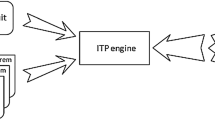Abstract
An approach for formalizing hardware behaviour is presented which is based on a small functional programming language called primitive ML (PML). Since the basic constructs of PML are simply typed λ-terms, PML lends itself both to simulation and verification. The semantics of PML is formally embedded in higher-order logic.
The formalization scheme is based on PML-functions that allow hardware descriptions from the logical level up to the algorithmic level. Besides descriptions of real circuits, abstract forms of hardware descriptions can also be dealt with in PML. The main emphasis is thereby put on regular hardware structures which are described by means of primitive recursion. PML-descriptions can easily be converted to syntactic structures, called hardware formulae, which can then be verified by the MEPHISTO system.
This work has been partly financed by a german national grant, project Automated System Design, SFB No.358.
Preview
Unable to display preview. Download preview PDF.
Similar content being viewed by others
References
R. Boulton, A. Gordon, M. Gordon, J. Herbert, and J. van Tassel. Experiences with Embedding hardware description languages in HOL. In V. Stavridou, T.F. Melham, and R. Boute, editors, Conference on Theorem Provers in Circuit Design, IFIP Transactions A-10, pages 129–156. North-Holland, 1992.
R. Boulton, M. Gordon, J. Herbert, and J. van Tassel. The HOL verification of ELLA designs. In International Workshop on Formal Methods in VLSI Design, January 1991.
D. Borrione, L. Pierre, and A. Salem. Formal verification of VHDL descriptions in Boyer-Moore: First results. In J. Mermet, editor, VDHL for Simulation, Synthesis and Formal Proofs of Hardware, pages 227–243. Kluwer Academic Press, 1992.
A. Camilleri, M.J.C. Gordon, and Th. Melham. Hardware verification using higher order logic. In D. Borrione, editor, From HDL Descriptions to Guaranteed Correct Circuit Designs, pages 41–66. North-Holland, 1986.
J. Camilleri. Executing behavioural definitions in higher order logic. Technical Report 140, University of Cambridge Computer Laboratory, 1988.
J. Camilleri. Symbolic compilation and execution of programs by proof: a case study in HOL. Technical Report 240, University of Cambridge Computer Laboratory, 1991.
E. Gunter. Why we can't have SML-style datatype declarations in HOL. In L.J.M. Claesen and M.J.C. Gordon, editors, Higher Order Logic Theorem Proving and its Applications, volume A-20 of IFIP Transactions, pages 561–568, Leuven, Belgium, 1992. North-Holland.
W.A. Hunt. The mechanical verification of a microprocessor design. In D. Borrione, editor, From HDL Descriptions to Guaranteed Correct Circuit Designs, pages 89–132. North-Holland, 1986.
S.L.P. Jones. The Implementation of Functional Programming Languages. Prentice Hall, 1987.
R. Kumar, K. Schneider, and Th. Kropf. Structuring and automating hardware proofs in a higher-order theorem-proving environment. Journal of Formal Methods in System Design, 2(2):165–223, 1993.
T. F. Melham. Automating recursive type definitions in higher order logic. Technical Report 146, University of Cambridge Computer Laboratory, September 1988.
K. Schneider, R. Kumar, and Th. Kropf. Eliminating higher-order quanitifers to obtain decision procedures for hardware verification. In International Workshop on Higher-Order Logic Theorem Proving and its Applications, Vancouver, Canada, August 1993.
M. Sheeran. Retiming and slowdown in Ruby. In G.J. Milne, editor, The fusion of Hardware Design and Verification, pages 289–308, Glasgow, 1988. North Holland.
Author information
Authors and Affiliations
Editor information
Rights and permissions
Copyright information
© 1994 Springer-Verlag Berlin Heidelberg
About this paper
Cite this paper
Eisenbiegler, D., Schneider, K., Kumar, R. (1994). A functional approach for formalizing regular hardware structures. In: Joyce, J.J., Seger, CJ.H. (eds) Higher Order Logic Theorem Proving and Its Applications. HUG 1993. Lecture Notes in Computer Science, vol 780. Springer, Berlin, Heidelberg. https://doi.org/10.1007/3-540-57826-9_128
Download citation
DOI: https://doi.org/10.1007/3-540-57826-9_128
Published:
Publisher Name: Springer, Berlin, Heidelberg
Print ISBN: 978-3-540-57826-0
Online ISBN: 978-3-540-48346-5
eBook Packages: Springer Book Archive




